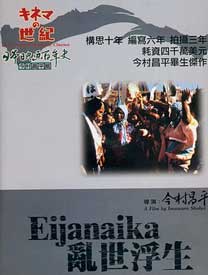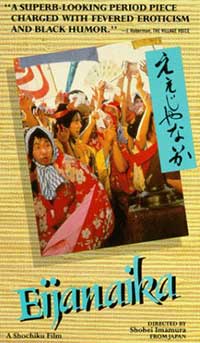 The word "eijanaika" translates roughly as "why not?" or "so what!" & represents a devil-may-care attitude & a movement which spread throughout Japan in the third year of Keio (1867).
The word "eijanaika" translates roughly as "why not?" or "so what!" & represents a devil-may-care attitude & a movement which spread throughout Japan in the third year of Keio (1867).
Historically the Eijanaika movement is subject to interpretation. Were the peasant riots instigated by anti-Shogunate forces to unsettle the government? Or were they spontaneous eruptions among the general population, pushed too far by the inflation prior to the Meiji Restoration? Shohei Imamura's film Eijanaika (1980) suggests a complex mixture of both.
The central story deals with a farmer named Genji (Shigeru Izumiya). He was shipwrecked on his way to Yokohama & saved by a passing American ship, unable to return to Japan for six years.
He returns to his village to discover his wife has been sold as a servant. By the time Genji finds Ine (Kaori Momoi), she has become a successful entertainer of the East Ryogoku district in Edo, & mistress to the district boss. The bulk of the film follows the low-life of Edo with all its whores, pimps, pickpockets, dwarves, lady wrestlers, & sideshow entertainments.
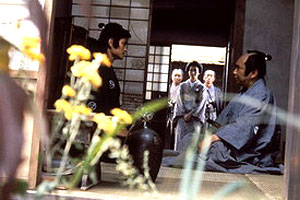 Dissatisfied with the feudal system, Genji dreams of returning to America with Ine, for only in America can farmers own their own land. Dissatisfied with the feudal system, Genji dreams of returning to America with Ine, for only in America can farmers own their own land.
But Ine has come to love the wild life of Edo. Genji must choose between Ine & the imagined freedom of America.
When he chooses to stay in Edo, it is indicative of his growing belief that Japan is indeed changing due to inside & outside influence & interference. He is swept up in the Eijanaika movement, moving to the forefront of the frenzied release of tensions among the people of the entertainment district.
Interacting with these central characters are a host of supporting players, each with his own story entwined with the rest. Itoman, played by Masao Kusakuri from The Last Swordsman (Okita Sohji, 1974) & Himiko (1974), has come to Edo from the Ryukyu Islands on a mission of vengeance.
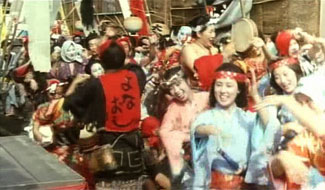 His target is a samurai of Satsuma named Ijuin (Minori Terada), a man involved in the Satsuma & Choshu conspiracy against the Tokugawa shogunate. His target is a samurai of Satsuma named Ijuin (Minori Terada), a man involved in the Satsuma & Choshu conspiracy against the Tokugawa shogunate.
The moment when Itoman is in position to achieve this revenge is tense & realistic -- but there is nothing romantic about their duel. It is perfectly gruesome.
Both Itoman & Genji work for boss Kinzo (Shigeru Tsuyuguchi) who controls East Ryogoku, plays toady to the shogunate, & sells guns simultaneously to the shogunate & Satsuma rebels, aided by a powerful, elderly merchant (Norihei Miki).
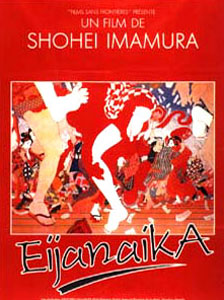 Another excellent character is Furukawa (Ken Ogata), a rough, shambling ronin who had once been hatamoto (direct retainer to the Shogun). Another excellent character is Furukawa (Ken Ogata), a rough, shambling ronin who had once been hatamoto (direct retainer to the Shogun).
He has fallen from grace, lives among & empathizes with the entertainers of East Ryogoku, yet remains incapable of overcoming his samurai background. He cannot adjust to the changes in the world.
He loves a blind ex-courtesan named Yoshino (Shino Ikenami) with whom he eventually commits love-suicide, escaping a world that has fewer & fewer places for samurai.
The martial arts action is realistic to an extreme, though not the film's predominant feature. When ronin Furukawa is hired to kill the radical Tokugawa reformist Hara (Yohei Koono), it is a quick, sad, ugly, fight.
Furukawa's sword clearly passes through Hara's body rather than harmlessly under the armpit as in so many less convincing films. An audience with who I watched Eijanaika, jaded to chambara, gasped aloud, so convincing was Hara's demise.
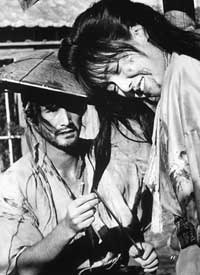 In another sequence, Itoman bleeds his fallen enemy like a hog, in order to make victory paint from his blood. The sequence looks & sounds as though Ijuin is really being ghoulishly leeched of vital fluids. In another sequence, Itoman bleeds his fallen enemy like a hog, in order to make victory paint from his blood. The sequence looks & sounds as though Ijuin is really being ghoulishly leeched of vital fluids.
Yet such violent actions are never quite exploitative. These scenes are merely honest, & the film is really built around characterization, not violence.
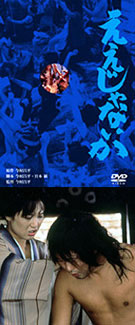 It's also a film with great humor. Boss Kinzo's thieves, hiding in the grass as police pass by with lanterns, cannot help but remark among themselves, "This is so much fun!" Only when Genji is framed & arrested & Sanji (Tsutomu Hiura) is murdered does the "fun" go out of their escapades. It's also a film with great humor. Boss Kinzo's thieves, hiding in the grass as police pass by with lanterns, cannot help but remark among themselves, "This is so much fun!" Only when Genji is framed & arrested & Sanji (Tsutomu Hiura) is murdered does the "fun" go out of their escapades.
Another scene of great humor is when the magistrate (Hideo Takamatsu) threatens to have his men fire rifles into a festive crowd which is hop-dancing & singing "Eijanaika! Eijanaika!" The response is for several women, including Ine & throaty-voiced Oko (Mitsuki Baisho), to lift up their kimono, show their bottoms, & pee in front of the police.
Again, such high comedy ends in dramatic tragedy when the government opens fire on the entertainers with the very guns boss Kinzo had been selling. Genji is wounded yet says, "If we must die -- why not?" & tries to keep dancing.
The film is epic length but moves swiftly. The story is convoluted but easy to follow. The scenes toward the end of frenzied celebrating & singing make for classic cinema. Director Imamura captures vividly a moment in history when people decided they were just going to have a good time, because, eijanaika -- why not?
copyright © by Paghat the Ratgirl
|
